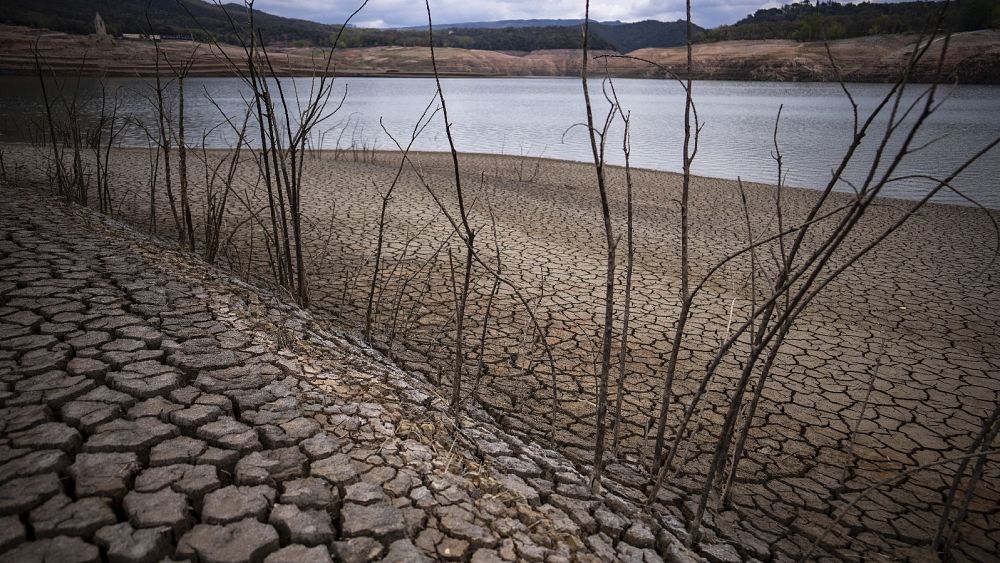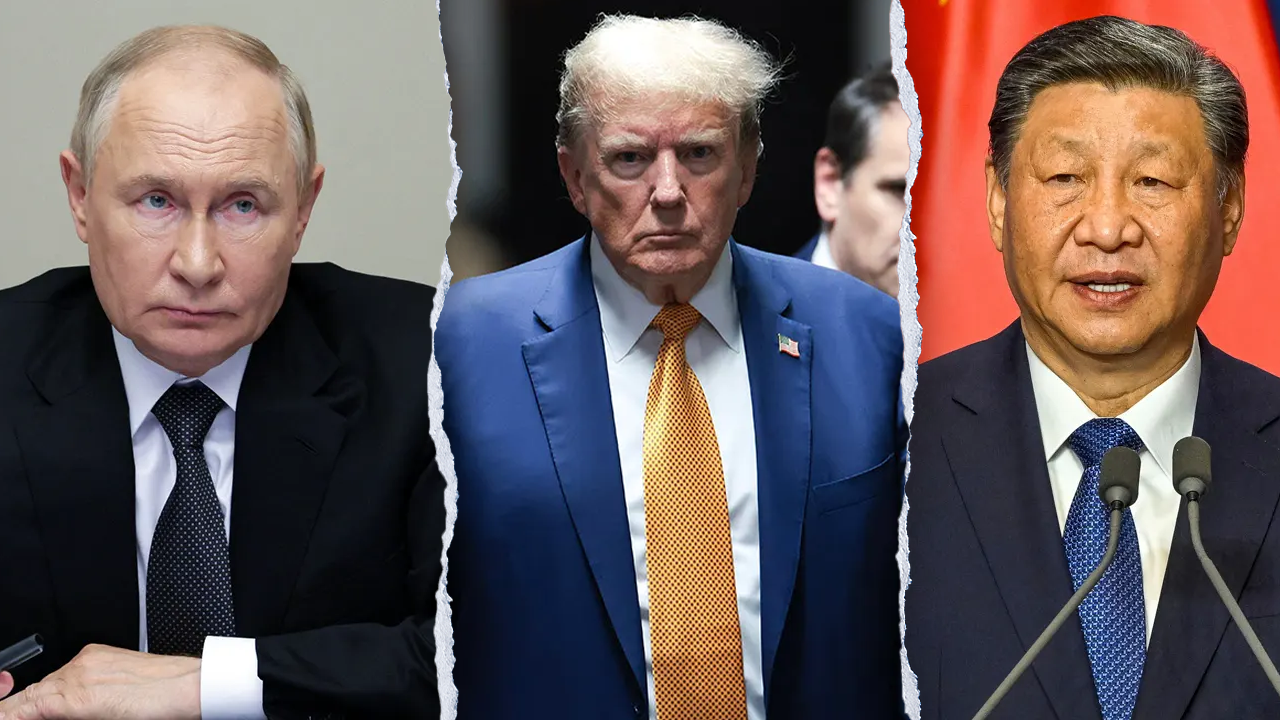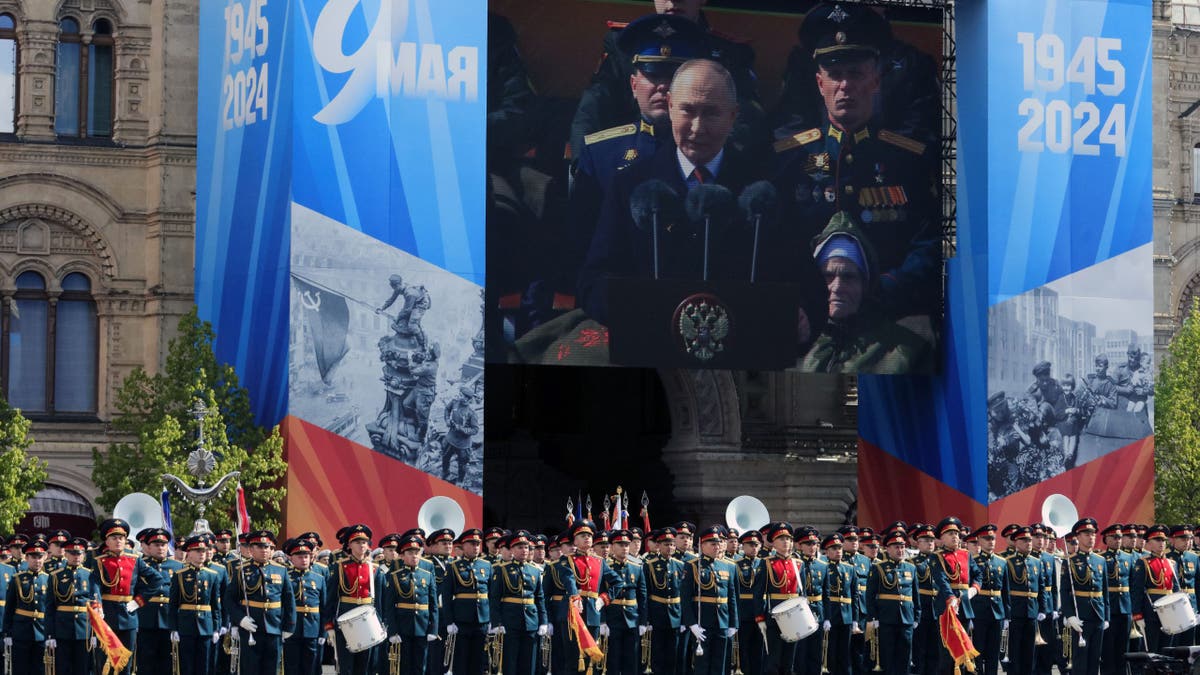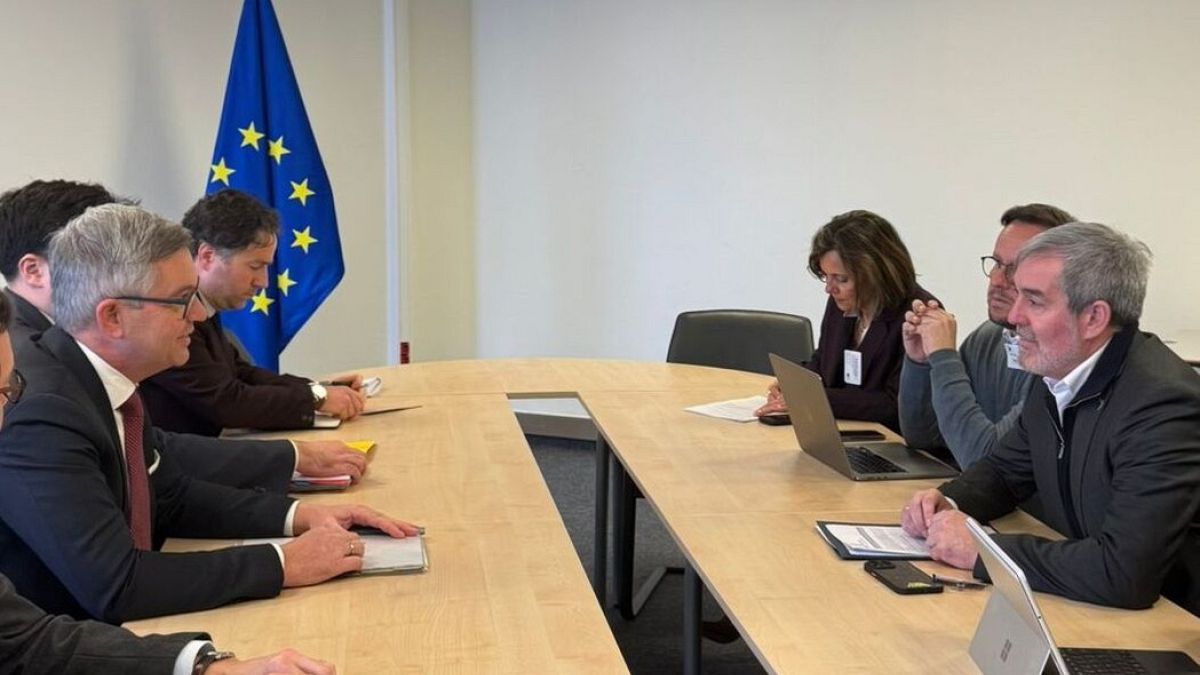World
Water lorries and reused wastewater: How EU countries battle drought

Spain, Italy and France are being impacted by drought and are using various methods to alleviate water stress for residents and farmers.
Spaniards have a saying that during droughts, the trees chase after the dogs.
However, in L’Espluga de Francoli, it is the people who are desperate for any signs of water.
Like scores of towns across Spain, this municipality in the hills of Catalonia, has had water restrictions imposed since August last year.
Spain registered the driest start to the year since records began in the 1960s, with Catalonia and the southern region of Andalusia the worst region affected.
Like many other European countries which are struggling to deal with lack of water, Spain has invested in how to confront this problem, with a €12 billion programme designed to reuse more water, build desalination plants, and improve water infrastructure.
“We require structural responses and constant investment,” Spain’s acting Environment Minister Teresa Ribera said after announcing the aid package last week.
Several heatwaves suffered in Spain and other parts of Europe this summer have raised water evaporation while consumption increased.
Reservoirs across Spain fell to 37% of normal levels, according to the latest government statistics.
Prayers, bottles and water lorries
In L’Espluga, Father Antonio Rosario has even called on the Lord to ask the heavens to open at a special service which dates from the 18th century. But his prayers have not been answered yet.
The town’s taps are turned off between 10pm and 7am, making it impossible to clean, wash plates or have a shower. As many Spaniards eat late, this affects their way of life.
During the day, villages collect water in bottles or buckets to have enough for daily essentials.
Up to ten water lorries every day, each carrying between 12,000 and 29,000 litres (3,170-7,660 gallons), bring relief to a town where aquifers are running dry.
“We have been on restrictions since August last year. The problem is that the underground water tables are running dry now so people with their own supplies from wells will soon be affected,” Pep Morató, council spokesman in L’Espluga de Francoli spokesman, told Euronews.
Authorities in Catalonia declared a ‘state of exception’ over the water shortage. Towns and villages under restrictions had to lower their consumption per person to 230 litres per day from 250 litres per day which was the level introduced in what authorities called ‘pre-alert’ situation.
Water for human use has not been limited yet but restrictions mean watering for agricultural purposes will largely be banned and use for industrial and recreational purposes must fall by 25%.
Currently, reserves have fallen to 22%, just slightly higher than in 2008 (20.5%) when ships carrying water were sent to Barcelona to relieve the crisis.
Constanza Saavedra, of the Catalan government’s climate action department, said Barcelona will not have to ship in water on boats as happened during the 2008 drought.
“In comparison with the 2008 drought, we generate more desalinated water which is roughly the same as a full reservoir,” she told Euronews.
Wastewater and digital solutions
In France, the government is planning to increase the use of wastewater to cut public water consumption.
France’s Environment Minister Christophe Béchu warned that the water crisis “is not yet behind us”.
In an interview with the Libération newspaper published last week, Béchu said despite increased rainfall in some parts of the country during the summer, nearly two-thirds of the country’s water tables remained below seasonal averages.
He said that 62% of groundwater sources were below seasonal averages and 18% were “very low”. Some 1,022 communes across France were designated ‘natural disaster zones’ for drought, according to the government.
The communes are mostly supplied by water trucks or bottled water because the tap water is either unsafe to drink or their taps have run dry.
The worst affected areas were in the Mediterranean basin, the Rhone Valley and Brittany.
In March, French President Emmanuel Macron presented a €180 million water-saving plan to cut use by 10% by 2030 and increase the reuse of wastewater from 1% to 10%. Part of the plan is to fix leaks which waste 20% of supplies every year.
In Italy, farmers are turning to old and new techniques to save production of staples like olive oil and prosecco.
Last year, the country suffered the worst drought in 70 years but 2023 has seen another sweltering summer broken up only by damaging hail storms in the north.
Andrea Ronca, who grows cereals at his family’s cattle farm in Mantua in northern Italy, uses satellite images to track where his land is driest.
“I can adjust irrigation at any time, even from my smartphone, avoiding any waste,” Ronca told Reuters.
The share of land farmed using digital tools rose to 8% in 2022, from 6% the year before, while spending on tech by farmers and governments rose to €2.1 billion from just €100m in 2017, according to the Smart Agrifood Observatory of the Milan Polytechnic and the University of Brescia.
Winemakers are using sensors to monitor the air and soil to gauge temperature and evaporation from the leaves. This helps vineyards to withstand the drought.
Simone Rech, who produces about 250,000 bottles of Prosecco sparkling wine in Treviso near Venice, said rainwater and wastewater from washing the cellar is collected, purified, and reused.

World
Rupert Murdoch's UK tabloids offer a rare apology in a legal settlement with Prince Harry
LONDON (AP) — Rupert Murdoch’s U.K. tabloids made a rare apology to Prince Harry in settling his privacy invasion lawsuit and will pay him a substantial sum, his lawyer said Wednesday.
Harry’s lawyer David Sherborne read a statement in court saying News Group offers a “full and unequivocal apology to the Duke of Sussex” for years of unlawful intrusion.
The bombshell announcement in London’s High Court came as the Duke of Sussex’s trial was about to start against the publishers of The Sun and the now-defunct News of the World for unlawfully snooping on him over decades.
Harry, 40, the younger son of King Charles III, and one other man were the only two remaining claimants out of more than 1,300 others who had settled lawsuits against News Group Newspapers over allegations their phones were hacked and investigators unlawfully intruded in their lives.
In all the cases that have been brought against the publisher since a widespread phone hacking scandal forced Murdoch to close News of the World in 2011, Harry’s case got the closest to trial.
Murdoch shut down the News of the World after the Guardian reported that the tabloid’s reporters had hacked the phone of Milly Dowler, a murdered 13-year-old schoolgirl, while police were searching for her in 2002.
As the case was about to start Tuesday morning, his lawyer asked for a one-hour recess, then got a longer adjournment and finally asked to have the rest of the day as it became clear a settlement was in the works.
The case was one of three lawsuits Harry has brought accusing British tabloids of violating his privacy by eavesdropping on phone messages or using private investigators to unlawfully help them score scoops.
His case against the publisher of the Daily Mirror ended in victory when the judge ruled that phone hacking was “widespread and habitual” at the newspaper and its sister publications.
During that trial in 2023, Harry became the first senior member of the royal family to testify in court since the late 19th century, putting him at odds with the monarchy’s desire to keep its problems out of view.
His feud with the press dates back to his youth, when the tabloids took glee in reporting on everything from his injuries to his girlfriends to dabbling with drugs.
But his fury with the tabloids goes much deeper.
He blames the media for the death of his mother, Princess Diana, who was killed in a car crash in 1997 while being chased by paparazzi in Paris. He also blames them for the persistent attacks on his wife, actor Meghan Markle, that led them to leave royal life and flee to the U.S. in 2020.
The litigation has been a source of friction in his family, Harry said in the documentary “Tabloids On Trial.”
He revealed in court papers that his father opposed his lawsuit. He also said his older brother William, Prince of Wales and heir to the throne, had settled a private complaint against News Group that his lawyer has said was worth over 1 million pounds ($1.23 million).
“I’m doing this for my reasons,” Harry told the documentary makers, though he said he wished his family had joined him.
Harry was originally one among dozens of claimants, including actor Hugh Grant, who alleged that News Group journalists and investigators they hired violated their privacy between 1994 and 2016 by intercepting voicemails, tapping phones, bugging cars and using deception to access confidential information.
Of the original group, Harry and Tom Watson, a former Labour Party member of Parliament, were the holdouts headed to trial.
News Group had denied the allegations.
NGN had issued an unreserved apology to victims of voicemail interception by the News of the World and said it settled more than 1,300 claims. The Sun has never accepted liability.
The outcome in the News Group case raises questions about how Harry’s third case — against the publisher of the Daily Mail — will proceed. That trial is scheduled next year.
World
Putin, Xi vow to ‘deepen’ alliance hours after Trump re-enters the White House

Chinese President Xi Jinping and Russian President Vladimir Putin on Tuesday pledged to “deepen strategic coordination” in a video call less than a day after President Donald Trump re-entered the White House.
A transcript of the call posted to the Kremlin’s website showed that both Putin and Xi referred to one another as “friends” and vowed to back one another’s strategic interests, no matter the “current global situation.”
“This year, I am ready, together with you, to elevate Chinese-Russian relations to a new level, to counter external uncertainties by preserving stability and resilience of Chinese-Russian relations,” Xi said while addressing Putin.
Russia’s President Vladimir Putin holds a video call with Chinese President Xi Jinping at the Novo-Ogaryovo state residence outside Moscow on Jan. 21, 2025. (Gavriil Grigorov/Pool/AFP via Getty Images)
TRUMP WANTS TO VISIT CHINA AGAIN AFTER HE TAKES OFFICE: REPORT
The pair both vowed to back the U.N.-centered international system ahead of the 80th anniversary this year, and to defend the post-World War II global order – a nod to Putin’s pursuit to reclaim Ukraine in what many have argued is an attempt to re-establish the Soviet Union.
Xi also told Putin about a call he had with Trump on Friday regarding TikTok, trade and Taiwan, according to a report by Reuters.
The Chinese and Russian leaders also reportedly “indicated a willingness to build relations with the United States on a mutually beneficial, mutually respectful basis,” Kremlin foreign policy aide Yuri Ushakov told reporters, adding this will happen “if the Trump team really shows interest in this.”
“It was also noted from our side that we are ready for dialogue with the new U.S. administration on the Ukrainian conflict,” he added.

Vladimir Putin and Xi Jinping attend a reception during the BRICS summit in Kazan, Russia, Oct. 23, 2024. (Alexander Zemlianichenko/Pool via Reuters)
RUSSIA, IRAN TO SEAL PARTNERSHIP TREATY DAYS BEFORE TRUMP TAKES OFFICE
Neither readouts of the call issued by China or Russia directly mentioned Ukraine, though Russia highlighted that Beijing has remained a major supporter of Moscow’s economy as it is the largest consumer of Russian energy resources – a major earner for Putin’s war effort.
“Five years ago, we launched the Power of Siberia gas pipeline together, and today, Russia has become the leading supplier of natural gas to China,” the Kremlin said in a readout.

Russian President Vladimir Putin delivers a speech during a Victory Day military parade marking the 79th anniversary of the victory over Nazi Germany in World War II in Moscow. (Tian Bing/China News Service/VCG via Getty Images)
Though according to Beijing, Moscow did directly address China’s interests in Taiwan and, according to the readout issued by the Chinese Communist Party, “Russia firmly supports Taiwan as an integral part of China’s territory and firmly opposes any form of ‘Taiwan independence.’”
“I believe that the past year was very good for us,” Putin said. “It can be said confidently that our foreign policy ties and Russia and China’s joint efforts objectively play a major stabilizing role in international affairs.”
World
With Trump in power, Europe may buy LNG, planes, and cut car tariffs

Bernd Lange, the president of the European Parliament’s trade committee, told Euronews how Europe could negotiate with US president Donald Trump if tariffs hit on European goods.
Today Radio Schuman speaks with Bernd Lange, chairman of the European Parliament’s Trade Committee, who noted that Europe still has room to respond to Trump’s policies.
In his inauguration speech, Donald Trump provided little detail regarding his earlier threats to impose tariffs on the European Union. His previously stated demand that Europe face tariffs unless it increased purchases of US oil and gas was already well-known, with many European politicians asserting they are prepared to respond proportionately.
Potential measures the EU could apply include increasing LNG imports and reducing car tariffs, the MEP says. Lange also stressed that the EU’s future trade agreements could be shaped in reaction to shifts in US trade policy.
Radio Schuman also has a quick look at the European Parliament’s agenda today and at the most depressed country in Europe.
Radio Schuman is hosted and produced by Maïa de la Baume, with journalist and production assistant Eleonora Vasques, audio editing by David Brodheim. Music by Alexandre Jas.
-
/cdn.vox-cdn.com/uploads/chorus_asset/file/25826211/lorealcellbioprint.jpg)
/cdn.vox-cdn.com/uploads/chorus_asset/file/25826211/lorealcellbioprint.jpg) Technology1 week ago
Technology1 week agoL’Oréal’s new skincare gadget told me I should try retinol
-
/cdn.vox-cdn.com/uploads/chorus_asset/file/25832751/2192581677.jpg)
/cdn.vox-cdn.com/uploads/chorus_asset/file/25832751/2192581677.jpg) Technology7 days ago
Technology7 days agoSuper Bowl LIX will stream for free on Tubi
-

 Business1 week ago
Business1 week agoWhy TikTok Users Are Downloading ‘Red Note,’ the Chinese App
-
/cdn.vox-cdn.com/uploads/chorus_asset/file/25835602/Switch_DonkeyKongCountryReturnsHD_scrn_19.png)
/cdn.vox-cdn.com/uploads/chorus_asset/file/25835602/Switch_DonkeyKongCountryReturnsHD_scrn_19.png) Technology5 days ago
Technology5 days agoNintendo omits original Donkey Kong Country Returns team from the remaster’s credits
-

 Culture4 days ago
Culture4 days agoAmerican men can’t win Olympic cross-country skiing medals — or can they?
-
/cdn.vox-cdn.com/uploads/chorus_asset/file/24774110/STK156_Instagram_threads_1.jpg)
/cdn.vox-cdn.com/uploads/chorus_asset/file/24774110/STK156_Instagram_threads_1.jpg) Technology1 week ago
Technology1 week agoMeta is already working on Community Notes for Threads
-

 Culture2 days ago
Culture2 days agoBook Review: ‘Somewhere Toward Freedom,’ by Bennett Parten
-

 Politics5 days ago
Politics5 days agoU.S. Reveals Once-Secret Support for Ukraine’s Drone Industry















